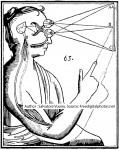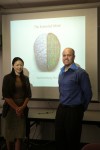 Welcome!
Welcome!
Please start here for an orientation to the site and use the menu bar options to choose supports for specific courses at our universities.
Educational Philosophy
Education should be a process and time of unfettered learning and exploration, so what can we do to support and enhance this? We have passed from the ages where knowledge was scarce (the dark ages) to an age where the amount of knowledge is impossibly large (the white-out age, or the information overload age). The great challenge to learners, teachers, and guides is how to select, organize, prioritize and recall the information we need to support our goals and answer our questions. To help with these issues, my University Course Supports were designed to improve exploration and memory so that you can learn more easily. The easier it is to find credible information, see how that fits into the big picture, and make it easy for us to retrieve, the more we can engage in productive learning.
If you are new to my classes, please visit my
-
New Student Orientation
-
and let me know if you have any questions. Click here to view and add comments for Dr. Greenberg.
If you want to see a teaching philosophy I love, please view the following video:
Applied Electronic Mind-Mapping
Speeches – Feed Your Mind
We must be inspired to take our best actions, and we must be disturbed if we are to go outside of our current conceptions. By definition, the status-quo is adequate only for this brief moment. Nature “knows” that modification is required for longevity and our bodies are built with these mechanisms. Flexibility and change is an inherent need, a biological reality, and so our educational mechanisms should be similarly constructed. Evaluate your own education now – are you being challenged? Are you exposed to ideas that make you say WOW every single time? Are you writing down your ideas? The now famous Anthony Robbins has said something close to the idea “If it is worth learning, it is worth writing down”. I’m mentioning this because being exposed to ideas is not enough in our high-stimulation, information overload world. If we want knowledge, skills, ideas, and wisdom to be “sticky”, we need to process it more than once, and in more than one format. See it, hear it, do it, feel it, and write it down to give your brain the memory support it needs. I guarantee you will be shocked at what you can come up with, and pleased that you took regular action to capture your ideas electronically for fast-retrieval in the future.
Why mention all this? Because by definition, education is new to us and we don’t have a good reference with which to judge its quality, efficacy, and value. You pay money, but what do you get? How does what you buy compare to what other people get for their dollars? How invested is your professor?
Who really knows if your curriculum and training is good enough to help you earn a living? How can you tell if your school, teachers, learning materials, assignments, and evaluations are difficult and inspiring enough to make you competitive upon graduation? Here you will find a growing set of links to challenging/inspiring resources and assignments or projects.
Because I teach at many different universities, yet everybody has similar fundamental needs, this section is meant to be a general purpose prep tool. Use the student support pages to help prepare yourself for as much as possible, before, during, and after your formal education. Because teaching is fundamentally about helping you physically incorporate new knowledge & behavior into your existing neural networks and to challenge/expand prior understandings, these ideas should be reviewed regularly during your programs of study.
This section of my site is for all students and each sub-section supports a different class. Proprietary university information is not shared here, and none of this material is required reading unless you received notice in your class. Here you will also find content to support your general education, psychology, neuroscience, research, writing, and ethics courses.
Perspective
The best advice I’ve ever heard about learning came from my friend Stephen (now Dr. Stephen Cowen) before we achieved our PhD’s and after he was annoyed with the thousandth question I asked him that day. He said in a short tone, “Paul, you must be the knowledge invader.” and then he indicated that I would have to do that invading with other people because he was running out of time and patience that day. We were classmates then – back in 1999 but across the years that idea just becomes more and more important. Become the knowledge invader.
If you do this, you’ll be amazed at what you find, amazed at what is hidden or overlooked, and you will need good tools and systems to help you manage and expand your knowledge/skills. If you don’t do this, you’ll have to live with what other people give you.
To take you from theories of learning, education, and students into how to learn in the information overload age, I want to give you a visual metaphor for information.
Learning and Teaching as Information flow and Processing
Imagine that culture, knowledge, and skills are bodies of water that are organized as oceans and rivers of information, and you are standing within the flow. Think of all the ways that water can flow around, under, or over you.
All information and culture that you encounter throughout life will take one of four paths.
1) The first path is complete ignorance, where knowledge and information pass you by without you being aware that they exist – this is by far the largest category and due to the number of things that can be known and done as compared to the amount of time it takes to learn.
2) The second flow of information constitutes the ideas you hear, but don’t understand them and don’t explore them. This second largest category is another form of ignorance, but it has some use.
3) The third path of knowledge is what happens between age 3 and 21 where you become aware of many things, remember some of them, and build a wide range of useful skills. This is information that you are processing and retaining – absorbing and re-purposing to suit your needs.
4) The fourth path of knowledge is where you delve deeply into one or more topics and become very learned and very skillful in these areas. Here you have been exposed to many things and have encoded these pieces of information and skill very well inside your nervous system.
Given these paths as well as the process of forgetting, knowledge, information, culture, and the environment are streams of information that can either pass us by entirely, bounce off us, or be absorbed to a lesser or greater degree. Because the first two paths are mostly useless, I want you to start thinking about how you are going to engage at the third and fourth levels of acquiring knowledge and skill…while keeping your eyes open for all the interesting things around us. Your Core Learning System will be an extreme help if you want to capture and write out your life plans right alongside your personal knowledge base. Steve Jobs commented on how creativity is connecting the dots, so when you think about life and knowledge, there is great benefit to making it a lot easier to connect the dots. Your electronic Core Learning System is meant to make this easier on your brain.
A simple philosophy for engaged learning.
What is education supposed to do? “The function of education is to teach one to think intensively and to think critically. Intelligence plus character – that is the goal of true education.” — Martin Luther King, Jr. How does learning happen? Learning is when your brain changes in response to experience and when your mind gains new knowledge, perspectives and skill. Teaching is helping this happen. Engaged learning is when students and instructors together bring all ideas to life. By applying the three fundamental perspectives of pathos, ethos, and logos (classical persuasive methods of Greek philosophers) we can all promote engaged learning and know how to approach any new idea.
Pathos
Engaged learning requires the strongest of human motivation, our emotions. My first step is teaching is to help all people tap into their emotion, motivation, and values. You won’t learn much if you don’t care and you won’t listen if your instructor does not care. Passions drive learning to its heights. In any class, I want to know your motivations so we have the easiest time bringing out your best performance.
Ethos
After emotion and motivation, the best learning comes from finding instructors with the best ethics, character, credibility, authority, and expertise. Spend your time with people who are worth listening to, who know that their first job is to listen to you, and who have gone to great lengths to make a vast world of knowledge identifiable, accessible, digestible, and immediately useful. If you are taking my classes through Synergy Learning Institute, we select all instructors for these qualities. No matter who your instructor is, use the internet to find the best speakers on the issues that inspire you the most.
Logos
Logic and clear evidence are the final steps to building your engine of productivity, feeding your understanding, or attaining any of your other goals. Learning is best when all involved are emotionally engaged and you are being instructed by people with strong character and credibility. To see examples of logic and evidence, please visit my university support pages for research, statistics, biopsychology and more. University Course Supports is regularly updated with increasingly useful information. If you are taking the Mind Tools series of courses, then you are also free to use these information pages for your future studies in other programs.

 Brain Scientist, Entrepreneur, Speaker, Professor - Everybody has more potential than can be acted upon. It is a joy to help people of all ages tap into more of this long-term potential while also getting immediate benefits in daily life. Fast training programs make it simpler for you to use neuroscience and free "thought support" software to simplify & improve life, work, and achievement in the Information Overload Age. Write with your questions.
Brain Scientist, Entrepreneur, Speaker, Professor - Everybody has more potential than can be acted upon. It is a joy to help people of all ages tap into more of this long-term potential while also getting immediate benefits in daily life. Fast training programs make it simpler for you to use neuroscience and free "thought support" software to simplify & improve life, work, and achievement in the Information Overload Age. Write with your questions.